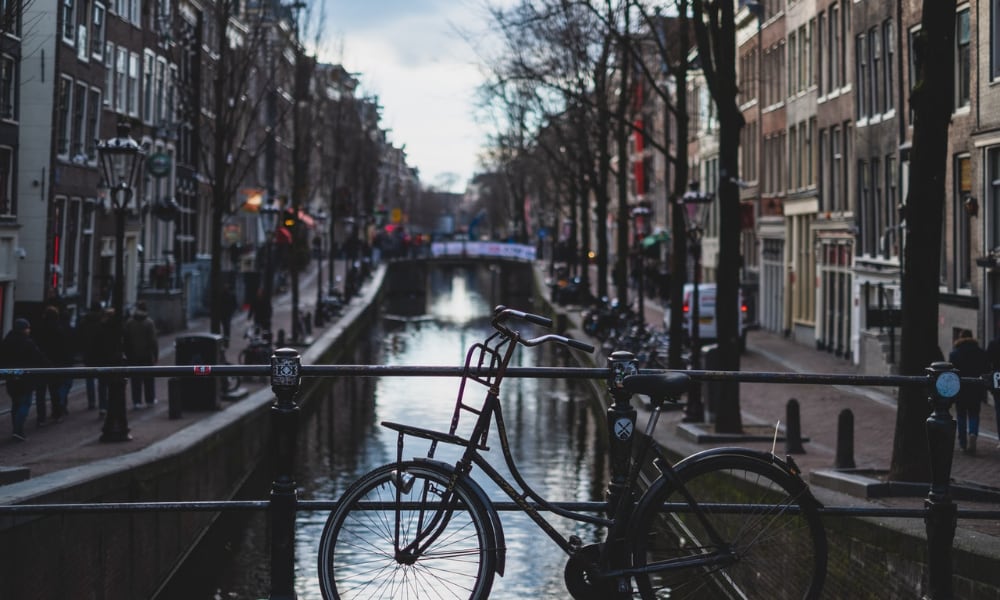Going Dutch in the Time of COVID-19
M.A. in Political Science, European Union Policy Studies
By Seth Tallvik
Date nights out may no longer be possible in cities across Europe, but the Netherlands is still managing to split the bill between practical economic and human-centered social policies in the face of a global pandemic. Even before leaving my adopted home in Sweden for my new life in the Netherlands earlier this year, the reputation of Dutch pragmatism preceded itself. The Dutch phrase, doe maar gewoon, or “less is more,” is often used to represent the cultural norms of practicality and modesty, and this has only been further validated by my experience of their “intelligent lockdown” response to COVID-19.
While I have now worked from home and avoided public transport for almost two months, as encouraged by the government and my employer, I am free to enjoy the spring sun in walks through public parks or by joining the throngs of cyclists in Amsterdam’s maze of bike paths along narrow streets and canals. Even though my husband’s birthday dinner was enjoyed at our own table, rather than at the restaurant that I carefully reserved weeks before the lockdown, we find ourselves in a city and country that are making efforts to strike a balance between individual livelihoods and the collective good. That government effort seems to resonate with its residents, as Dutch prime minister, Mark Rutte’s approval rating has soared from 45 to 75%.[1] Despite social restrictions and the forced closure of many businesses threatening to shrink the Dutch economy by 7.5% and doubling unemployment to 6.5% in 2020[2], extensive government efforts to provide direct financial support to affected employers, the self-employed, and underemployed give many hope that the potential long-term economic and social consequences of COVID-19 will be mitigated. Now, as my hair threatens to overtake my ears and resist the confines of any mortal hat, it has been announced that the Netherlands is plotting its return to normalcy via a phased six-month approach. First to open are close-contact professions, which thankfully for me includes my barbershop. The planned approach aims to gradually reopen the economy while ensuring that the country’s medical and social service providers can operate at, or under, capacity.[3]
Despite internal solidarity in Dutch society, there are accusations from some EU member state governments that the Netherlands’ pragmatic and humane approach is bound by its own national borders. Along with several other Northern EU member states, the Netherlands has been an outspoken critic and staunch opponent of the Eurogroup’s early proposed financial support packages to Eurozone members, especially those Southern members, who have experienced the most economic hardship due to COVID-19 lockdown measures. Specifically, the Dutch Foreign Minister, Wopke Hoekstra, has angered many by asking why “countries lacked financial buffers to cope” with negative effects that the pandemic has had on their national economies.[4] Eventually, a €540 billion package of financial aid was agreed upon, but a bitter taste was left in the mouths of many Eurogroup members as they frowned upon the seemingly transactional view by the Dutch of their relationship with the EU. President of France, Emmanuel Macron, warned that "people will say ‘What is this great journey that you [the EU] are offering? These people won’t protect you in a crisis, nor in its aftermath, they have no solidarity with you.’"[5] Despite accusations of short-sightedness and protectionist attitudes on the international stage, within the Netherlands there are longer-term visions of Europe after COVID-19 taking shape at a local level.
With one eye towards the urgent, short-term public health needs and responses, my own municipality of Amsterdam is also keeping an eye on how the city can step out of this crisis and into a more resilient and sustainable future. In 2019, Amsterdam, a city that occupies a mere 85 square miles and has less than 1 million residents (about half the size of Philadelphia), saw more than 19 million overnight visitors in what has become one of the busiest tourist centers of Europe. The head of Amsterdam’s marketing organization, Geerte Udo, recently shared that “the impact of the intelligent lockdown is very heavy on the whole industry, but it shows what Amsterdam is with only locals.”[6] While the city’s streets and canals, usually cramped with boats and busses of tourists and raucous stag and hen parties, lay quiet, the municipal government has been busy. Over the past two months, they have enacted an increase in tourism taxes, banned Airbnb rentals in the city center, and halted the opening of new “mono-culture” (read: cookie cutter) tourist shops.[7] Udo foresees that these actions will ensure a “balance between living, working and visiting” and galvanize the city’s new “Circular Economy” 2020-2025 Strategy, which is backed by both the Dutch and EU governments’ own circular economic policies. Amsterdam hopes to be a leading EU “circular city” by 2050 through thoroughly assessing “how societies and businesses can contribute to economic development while still respecting the limits of the planet and our society.”[8]
It is with this global, long-term perspective and approach that the Netherlands as a whole should move forward. From my own work and experiences in human rights and supply chain development, I have learned that a chain is only as strong as its most vulnerable links. Thankfully, Dutch government and society seem to recognize this within their own borders, but they must also accept that the chain extends further, both to other EU member states as well as vulnerable populations across the globe. In this instance, I hope that doe maar gewoon does not only reflect the Netherlands’ practicality in its short- and long-term response to the consequences of a global pandemic, but also its modesty in understanding that it is a small part of a larger whole.
Seth Tallvik graduated from the EUPS program in 2010 and earned his BA in Political Science from JMU in 2009.
[1] https://www.nytimes.com/2020/04/15/world/europe/coronavirus-presidents.html
[2] https://blogs.imf.org/2020/04/14/the-great-lockdown-worst-economic-downturn-since-the-great-depression/
[3] https://nltimes.nl/2020/05/06/roadmap-reopen-netherlands-unveiled-economic-assistance-planned
[4] https://www.theguardian.com/world/2020/apr/23/how-covid-19-poured-cold-water-on-netherlands-eu-romance
[5] https://www.politico.eu/article/wopke-hoekstra-netherlands-italy-corona-bonds-fight/
[6] https://www.dutchnews.nl/news/2020/05/new-future-for-amsterdam-post-corona-tourism-with-right-visitors/
[7] https://www.raadvanstate.nl/actueel/nieuws/@120846/amsterdam-nieuwe-toeristenwinkels-weren/
[8] https://www.amsterdam.nl/en/policy/sustainability/circular-economy/
